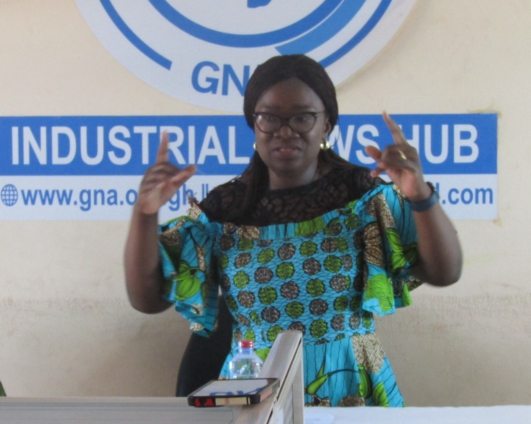Mothers and society must discontinue the old cultural practices of dribbling hot water into the genitals of babies, Dr. Amma Benin, a paediatrician at the International Maritime Hospital (IMaH) in Tema, has warned.
She explained that most often some mothers and grandmothers dribble hot water in the private part of the female and the anal of the male in order for the baby to pass stool.
"These actions can cause burns or even major problems to the baby," she said.
Dr. Benin gave the advice while treating the topic, "Cultural practises that affect child health" at the weekly "Your Health! Our Collective Responsibility! A Ghana News Agency initiative aimed at promoting health-related communication and providing a platform for health information dissemination to influence personal health choices through improved health literacy.

Dr. Benin also warned against giving alcoholic beverages and other traditional medicines to babies when they are unable to pass stool, stressing "If your baby cannot pass stool for some time, bring the baby to the hospital because there are medications that will be given to the baby".
She revealed that babies who were exclusively breastfed for six months did not usually have constipation.
"Normally, babies who are typically given formula tend to have more constipation than babies with exclusive breastfeeding."
Dr. Benin said that though some of the traditional practices in society were harmless, others might be harmful to the baby.
She encouraged mothers to apply for the National Health Insurance Card for themselves and their babies so that they can get free access to the hospital anytime there is a health issue.
She also encouraged pregnant women to prioritise anomaly scan sessions, which are conducted to check the well-being of the unborn baby and performed around the 20th week of pregnancy to detect possible defects in the baby the mother is carrying.
Dr. Benin said during the scan, checks on the physical development of the foetus are done, and certain congenital disorders, as well as major anatomical abnormalities, were also identified.
She said intensive counselling was given to the parents of the unborn baby to prepare their minds for the coming of the baby and mentor them on how to care for it.
The IMaH paediatrician cautioned against taking unprescribed medications during pregnancy, stressing that every pregnant woman must consult their gynaecologist and take only drugs prescribed by health officials.
Latest Stories
-
Center for Learning and Childhood Development Director Dr Kwame Sakyi honoured at Ghana Philanthropy Awards
3 hours -
Asantehene receives 28 looted artefacts
4 hours -
CAF WCL 2024: Ghana’s Thelma Baffour wins title with TP Mazembe
5 hours -
Benjamin Boakye slams politicisation of energy sector issues and ECG’s inefficiencies
5 hours -
Erastus Asare Donkor and Dr Neta Parsram win big at 10th Mining Industry Awards
5 hours -
Government is “suppressing information” about power sector challenges – IES Director
6 hours -
Majority of our debts caused by forex shortfall – ECG Boss
6 hours -
Pan-African Savings and Loans supports Ghana Blind Union with boreholes
6 hours -
Bole-Bamboi MP Yussif Sulemana donates to artisans and Bole SHS
7 hours -
Top up your credit to avoid potential disruption – ECG to Nuri meter customers
7 hours -
Dutch & Co wins 2024 Entrepreneur of the Year Award
7 hours -
We’ll cut down imports and boost consumption of local rice and other products – Mahama
9 hours -
Prof Opoku-Agyemang donates to Tamale orphanage to mark her birthday
10 hours -
Don’t call re-painted old schools brand new infrastructure – Prof Opoku-Agyemang tells gov’t
11 hours -
Sunon Asogli plant will be back on stream in a few weeks – ECG
11 hours

